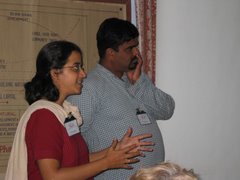Working with rural communities – for whom and by whom?
‘Voluntarism’ or ‘voluntary action’ is most evident at the community level, where men and women engage in a range of activities aimed at community good, without expectations of commensurate individual gains. Village level volunteers forming part of village management committees and demonstrate high levels of initiative in mobilizing the community and ensuring progress of projects/ tasks. They also take on management roles at the village level, often involving maintenance of complex records, accounts, liaising with banks, government, and other external agencies.
Dignity definitions
Most of these activities are not compensated for in monetary terms, though norms vary across communities and organizations. In instances where organisations/ movements bring in compensation measures based on levels of responsibility vested on local volunteers, volunteers identify themselves more as staff the organization, rather than the community. For the large numbers of volunteers who work on no remuneration or token amounts, the impetus comes from the position/ standing that they get both within their community and vis-à-vis outsiders, as they are the perceived leaders. There is a great sense of dignity that they derive from the positions they hold. ‘Dignity’ – Izzat is a very strong motivating factor. Several of these volunteers go on to participate actively in political processes in local governments (panchayats) or other government supported positions at the village level (health workers/ teachers/ VLWs, etc). How long does such voluntarism sustain and what are its limits and boundaries?
Who is ‘empowered’?
‘Empowerment’ is a common term used in most non-government action. This is interpreted variously, ranging from affirmative action by the ‘marginalised/ oppressed/ poor/ weak’ challenging social structures at the village level, to political assertion. The measures for ‘empowerment’ are more often set and decided by the facilitating agency (NGO) rather than the communities. So access to water and fuel (reduced drudgery of women) becomes a measure of empowerment, as does participation of women in public fora. Often community perception of ‘empowerment’ is widely different. Infact rarely are the community consulted on what they would construe as empowerment, though it must also be said that there may be overlaps in these views. Who decides if a community/ people are empowered, and how can this be measured? There is need to examine the contours of ‘empowerment’ from the perspective of facilitating agencies vs community.
Whose participation and how?
Facilitating agencies of most non-government action promote a range of forms of ‘community participation’ and collectives in an effort to nurture democratic processes at the local level. Several of these draw on existing leadership and collective management systems existing in the village. In several instances, they evolve over a period of time demonstrating characters that are valued by the promoting agency. These include participation/ representation of women in decision making bodies, representation across different caste categories, democratic decision making systems, etc. The robustness of such evolved forms of participation varies from community to community and is often reflected in nature of responsibilities vested/ appropriated by these collectives and acceptance within the community frame.
In a large number of cases however, there is a tendency to standardize the composition of community collectives based on formulae set by the facilitating agency. In such instances, the collectives are more perfunctory rather than real, having little role, responsibility or relevance in long term development processes. These are most evident where facilitating agencies implement government sponsored schemes, often resulting in multiple decision making bodies at the village level, having little correlation/ synergy with each other. Forms of people’s organizations/ institutions which evolve at the local level (rather than based on external prescriptions), develop deeper roots in community decision making processes and often thrive/ survive beyond the period supported by the external agency. They also develop greater affinity and play proactive roles in political processes/ Panchayats, etc. There appears to be a need for greater understanding of institutional forms at community level - evolved vs. prescribed. More importantly how do these forms of village institutions relate to legitimate forms of governance as embodied by Panchayats.
Poor are not passive takers, they have their cards and they play it
Working with communities requires negotiation of tricky spaces. In most instances people are looking for ways to maximize their benefits (individual or collective) and play their cards in such a manner to extract such benefits from facilitating agencies. There is the fallacious assumption that homogeneous village communities are egalitarian and work towards sharing benefits. Information asymmetry/ isolation of rural communities is another common argument placed by facilitating agencies to defend their usurpation of decision making spaces. This is often based on a gross under estimation of knowledge/ information available at local levels. People/ communities often go with and demonstrate allegiance to where they see/ perceive greater benefits at any point in time.
Community level dynamics are not understood, or missed by facilitating agencies not familiar with local dynamics, often because not enough time is spent in understanding socio-economic and political contexts and idiomatic processes. Their responses are tailored on set ‘global’ practices and have little contextualization to local conditions. Often even agencies with long term association/ local presence fail to anticipate/ detect these calculated responses by communities.
Questions are being asked about the role and relevance of interventions by NGOs, especially in the context of widening spaces of civil society as well as enlarging identities and domains of Panchayati Raj institutions. They are being called upon to be accountable and answerable to the communities they purport to serve and to establish their legitimacy for continuing interventions. Some honest introspection and search for answers would be useful.

No comments:
Post a Comment